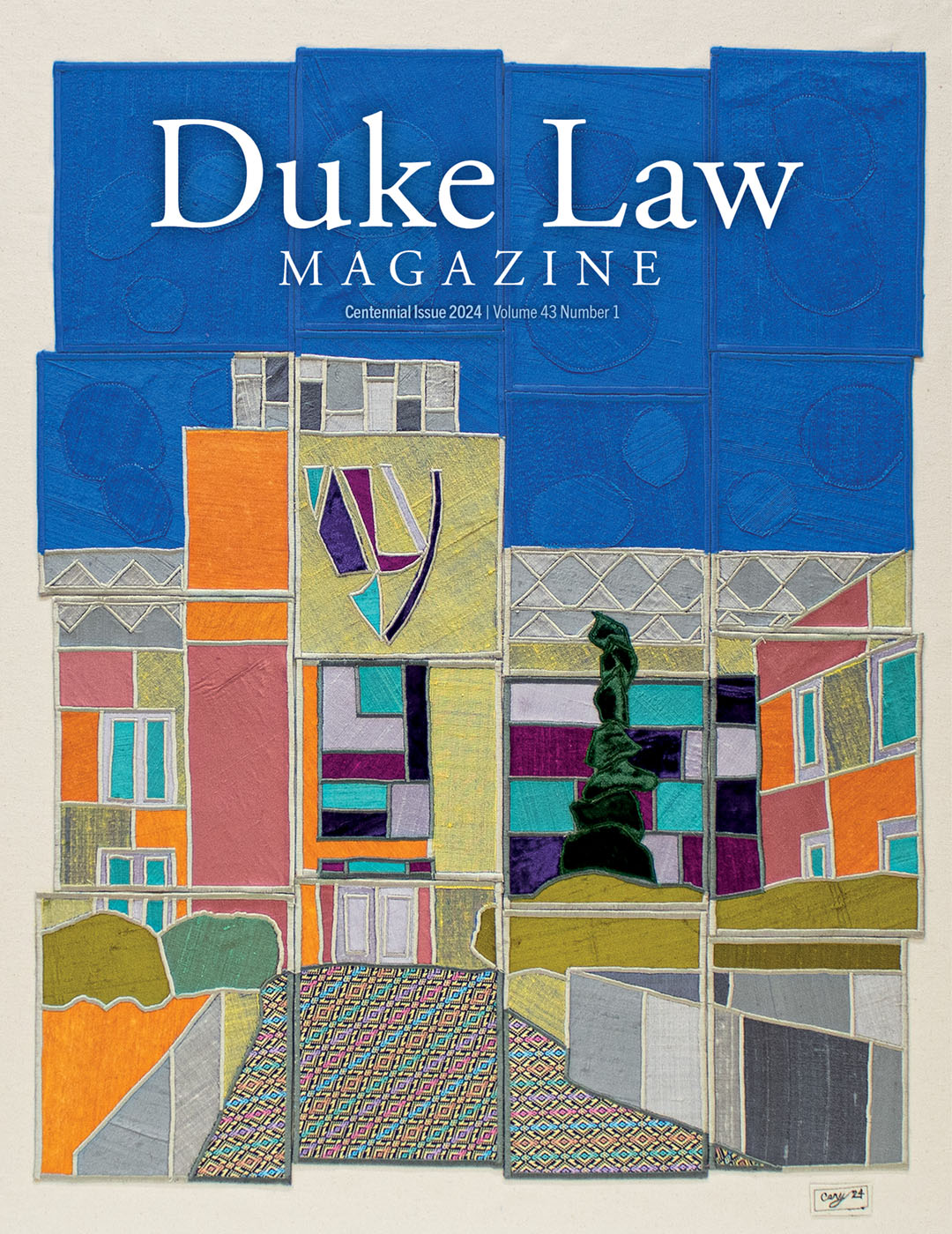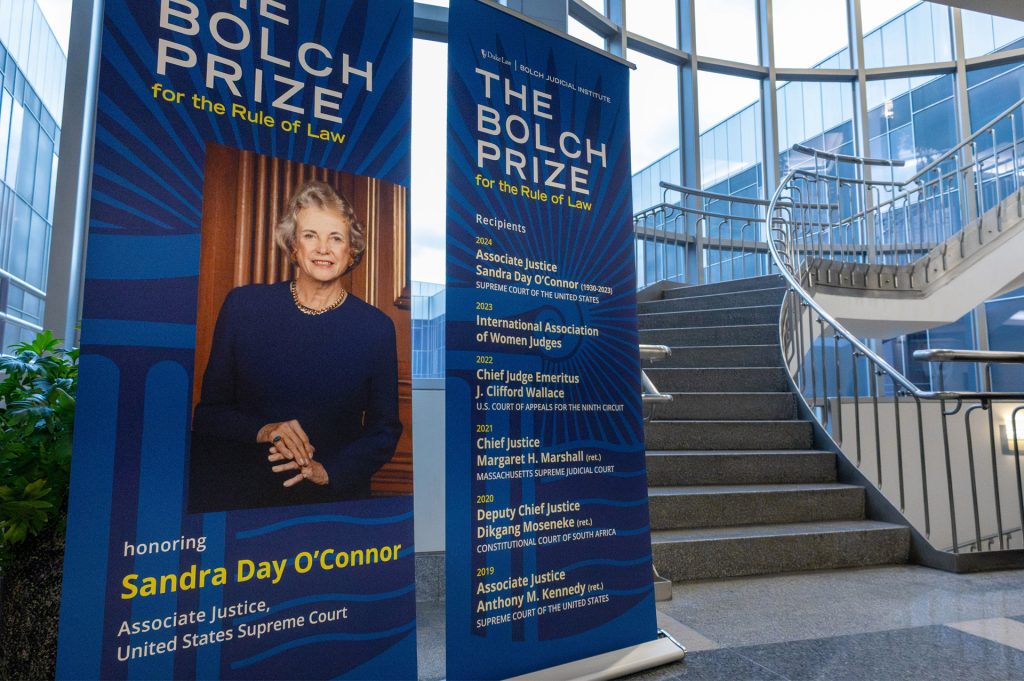
Justice O’Connor awarded Bolch Prize
Chief Justice Roberts honors Justice Sandra Day O’Connor during ceremony at Duke
Associate Justice Sandra Day O’Connor was celebrated as the 2024 recipient of the Bolch Prize for the Rule of Law during a private ceremony held at Duke University on April 4, 2024. John G. Roberts Jr., Chief Justice of the United States, delivered remarks honoring Justice O’Connor’s life and legacy, and Scott O’Connor accepted the prize on behalf of his late mother.
The Bolch Prize is awarded annually by the Bolch Judicial Institute of Duke Law School to honor an individual or organization’s extraordinary efforts to advance and protect the rule of law. The Bolch Prize ceremony highlighted Justice O’Connor’s dedication to advancing civic education in the United States through iCivics, a nonprofit she founded in 2009.
“Justice O’Connor retired as an active justice in 2006, but she really just kept going,” Chief Justice Roberts said. “She flew the flag by sitting on federal courts around the country to an extent few justices have since the earliest days of the Republic. She traveled the world to inspire others. She expanded her reach by going digital and launching iCivics in 2009, observing that the practice of democracy is not passed down through the gene pool. It must be taught and learned by each new generation. Today the Bolch Prize is so fittingly bestowed on Justice O’Connor because she lived so much of her life getting that done.”
“Sandra Day O’Connor expanded the public image of what it meant to look like a judge,” the Chief Justice continued. “She sounded the alarm about the growing lack of appreciation of what it means to be a citizen. She launched iCivics to do something about that.”
“… [T]he practice of democracy is not passed down through the gene pool. It must be taught and learned by each new generation.”
— Chief Justice John Roberts
In addition to Chief Justice Roberts and Mr. O’Connor, the ceremony featured remarks from Kerry Abrams, the James B. Duke and Benjamin N. Duke Dean of the School of Law; Susan Bass Bolch, cofounder of the Bolch Judicial Institute; Lisa Kern Griffin, a Duke Law professor and former law clerk to Justice O’Connor; Paul W. Grimm, director of the Bolch Judicial Institute and a retired federal judge; and David F. Levi, president of The American Law Institute.
“Justice O’Connor was a dear friend, colleague, and mentor to many in this room — and she was an inspiration to all of us,” said Dean Abrams. “Tonight we celebrate her impact as a pathbreaking public servant and justice of our highest court, a model of civility and bipartisanship, and a founding force behind a civic education renaissance in our country.”
Judge Grimm spoke of Justice O’Connor’s creativity in launching iCivics, which offers free games, lesson plans, and other resources designed to educate young people about the founding principles of the United States government. It now reaches nearly 10 million students each year.
“Justice O’Connor realized better than most of us that without a civically informed public, the rule of law cannot thrive,” Judge Grimm said. “And, in order for the public to have faith in our judicial system, which is essential to maintaining our democratic form of government, people must first understand how all three branches of government work together. We are so proud to honor Justice Sandra Day O’Connor’s lifelong devotion to advancing and protecting the rule of law, both as a political and judicial leader and as the architect of a renewal of civics education within our country.”
Scott O’Connor offered his family’s thanks for the prize and shared personal stories about his mother.
“Our deepest thanks from the O’Connor family go to Susan and Carl Bolch,” O’Connor said to Susan Bolch during the ceremony. “The description of the Bolch Institute and its goals appears to me as having possibly been written by mom as her dream for a legacy institute to carry on her most important interests. Your gift creating the Institute was made the same year that mom’s dementia caused her to withdraw from the public eye. Otherwise, she would’ve happily traveled to Durham to meet you and thank you personally for what you’re doing. I’m honored to accept the award for her.”
O’Connor explained that Justice O’Connor worked tirelessly after her retirement from the Court to speak to groups in the United States and around the world about the ideals of democracy. “She carried the message here and abroad that we need to treasure the rights that are guaranteed by our Constitution and recognize that judicial independence and the rule of law are, in her words, tremendously hard to create — and easier than most people imagine to damage or destroy.”
Through her work with the American Bar Association’s Central and Eastern European Law Initiative, she frequently met with judges, leaders, and citizens of other countries, carrying the prestige of her position as a retired justice of the United States Supreme Court as well as her deep belief in the rule of law.
“Her impact depended as much on her personal warmth and ability to relate to others as on her professional expertise,” O’Connor said.
“She traveled not to lecture but to discuss and learn together. During meetings she listened intently, questioned effectively, took copious notes and gave advice, not directives. She understood that the judicial approach and practices that work best here in the U.S. may not be the best for others and she conveyed that understanding and its acceptance.”
Griffin, who clerked for Justice O’Connor in the 1997-98 term, spoke of the justice’s warmth and care for her clerks — even as she held the highest expectations for their work. “She was disciplined and precise, but she was never dour in any way,” Griffin said. “She was warm and joyful with a mischievous sense of humor. She loved a wicked joke or a silly skit. She laughed often, and she smiled with a sparkle in her eyes.”
Griffin also recalled Justice O’Connor’s optimism, faith in her country, and respect and empathy for others. “She was always moving forward, and she carried other people along with her,” Griffin said, adding that Justice O’Connor’s “parting message was that we should all try to help others along the way.”
“At perhaps a dispiriting moment in our civic discourse, a spark of her optimism is a light that she left on — and that is iCivics,” Griffin said. “She founded this online resource to teach about the protections in our Constitution. She wanted schoolchildren to become committed citizens and not to take democracy for granted. I think the Bolch Prize is an especially fitting honor because it recognizes how she advanced the rule of law by modeling for us civil discourse and by continuing to teach citizenship even now.” — Melinda Vaughn
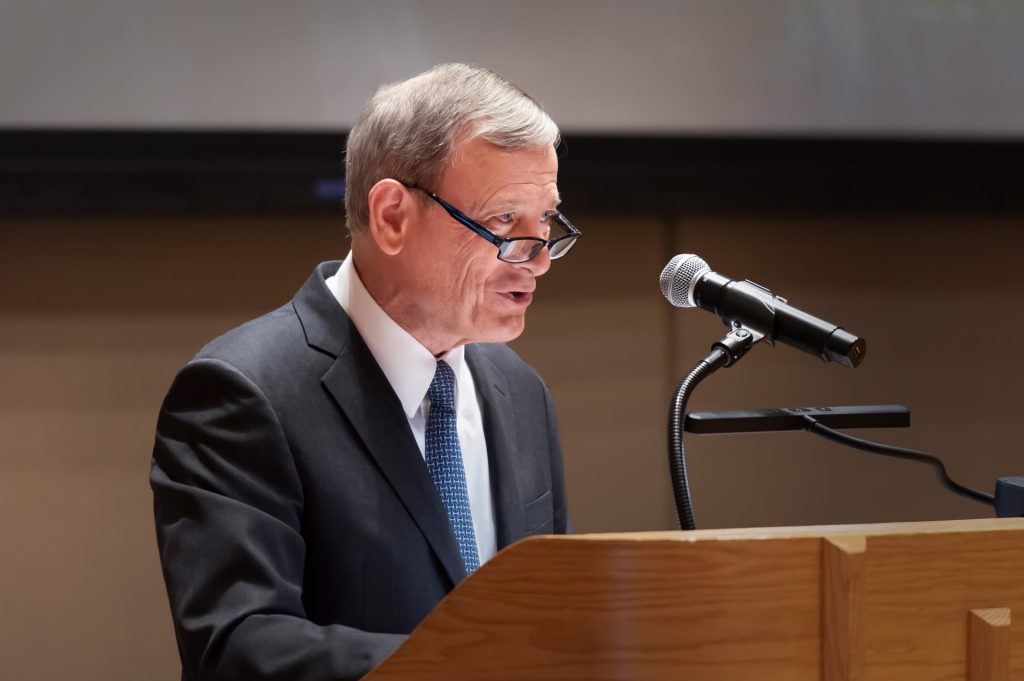
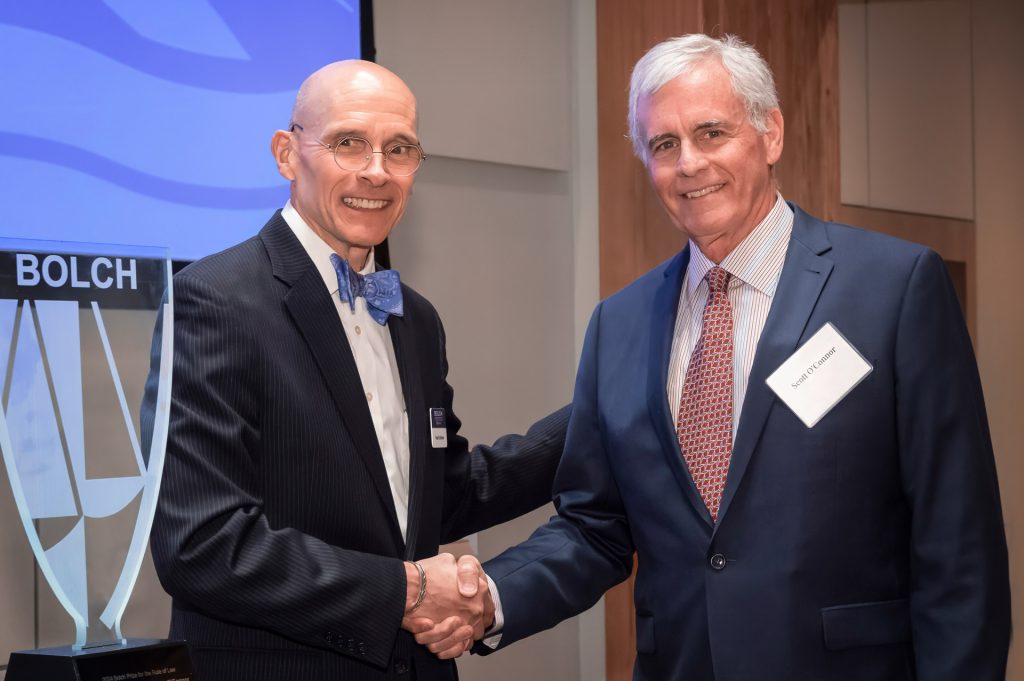
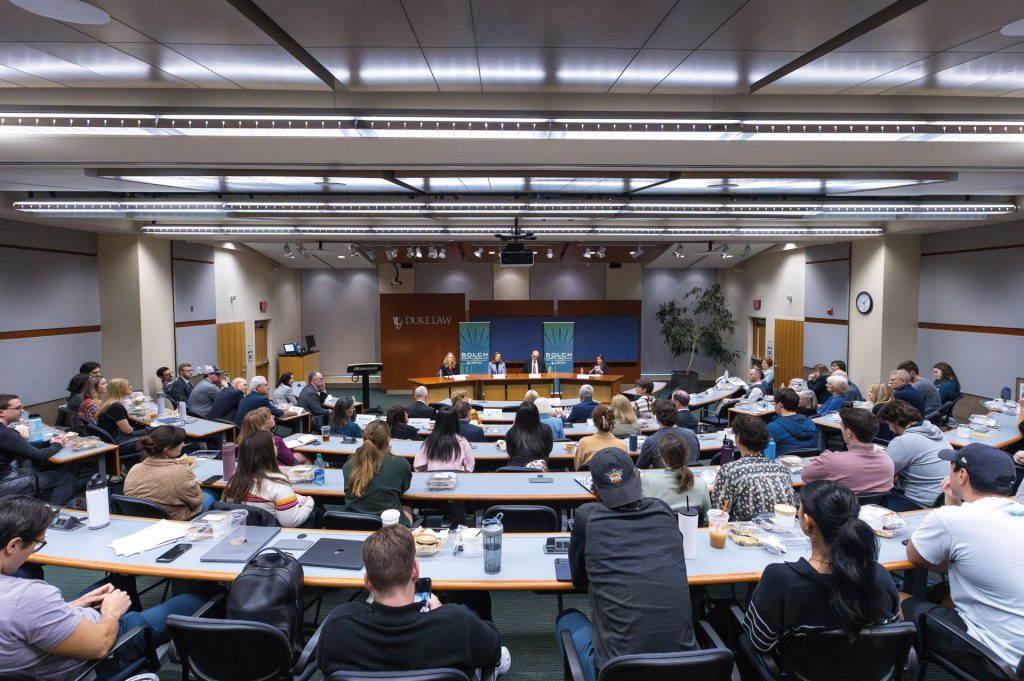
On clerking for O’Connor
“At the end of the [clerkship] interview, she said, ‘What do you think is the worst decision of this court?’ And I blurted ‘Bowers v. Hardwick,’ a 1986 decision holding that there was no constitutional objection to criminalizing same-sex sexual relations. She had joined that opinion. I think that shows, even though she was very firm in her own views, her willingness to listen to others, including the views of a pipsqueak 3L.”
— Matt Adler, Richard A. Horvitz Professor of Law and Professor of Economics, Philosophy and Public Policy (clerked for O’Connor 1992–1993)
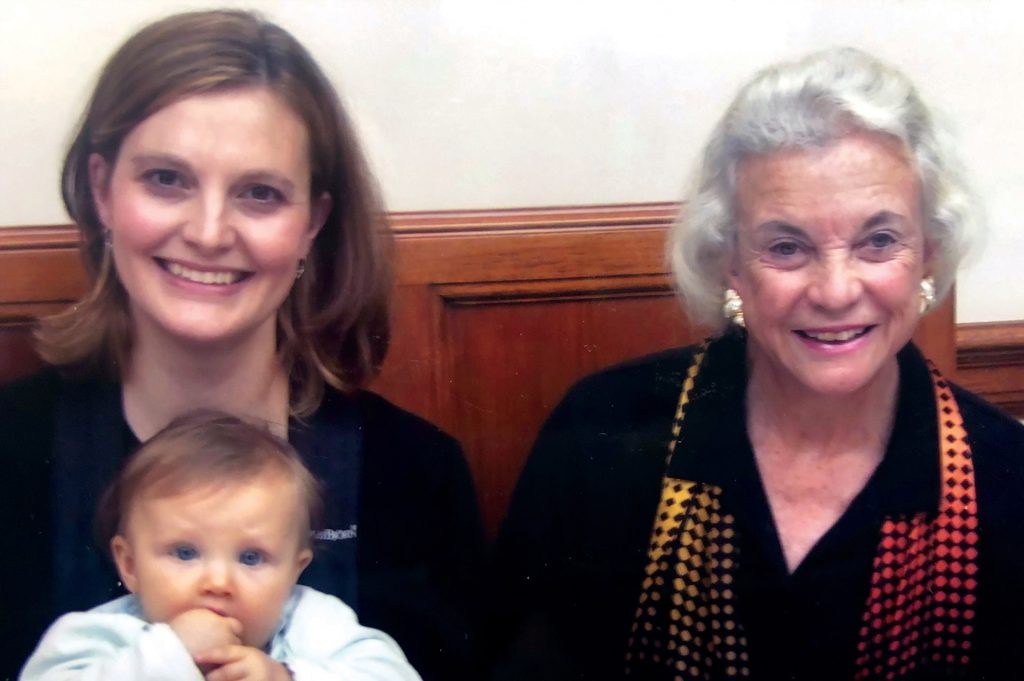
“The dignity and capacity that she displayed at all times made it possible for not just judges but politicians and lawyers and women in every profession to see themselves. She changed our collective consciousness about what women can do. She was the most powerful woman in the country when she was on the court. People sometimes called it the O’Connor Court. And that sort of discourse changes not only how women see themselves but how men see what women can do.”
— Lisa Kern Griffin, Candace M. Carroll and Leonard B. Simon Distinguished Professor of Law (clerked for O’Connor 1997–1998). Griffin (above) said the justice sent “O’Connor Grandclerk” t-shirts on the birth of her children.
“iCivics was her favorite thing to talk about. It was perhaps the thing she was the most proud of. Even beyond being the first woman on the court, she was so proud that she had built this remarkable organization that was helping high school students, and even younger, understand our democracy. At the time I don’t think I really understood why she cared so much, or what she clearly could see in the distance. But I certainly think she was prescient, and that her message that this work has to be ongoing, and that we need to take it seriously and elevate it, is really important, particularly so today.”
— Sarah Boyce ’12, Deputy Solicitor General of the North Carolina Department of Justice (clerked for O’Connor 2015–2016 [post-retirement] along with Justice Stephen Breyer)

